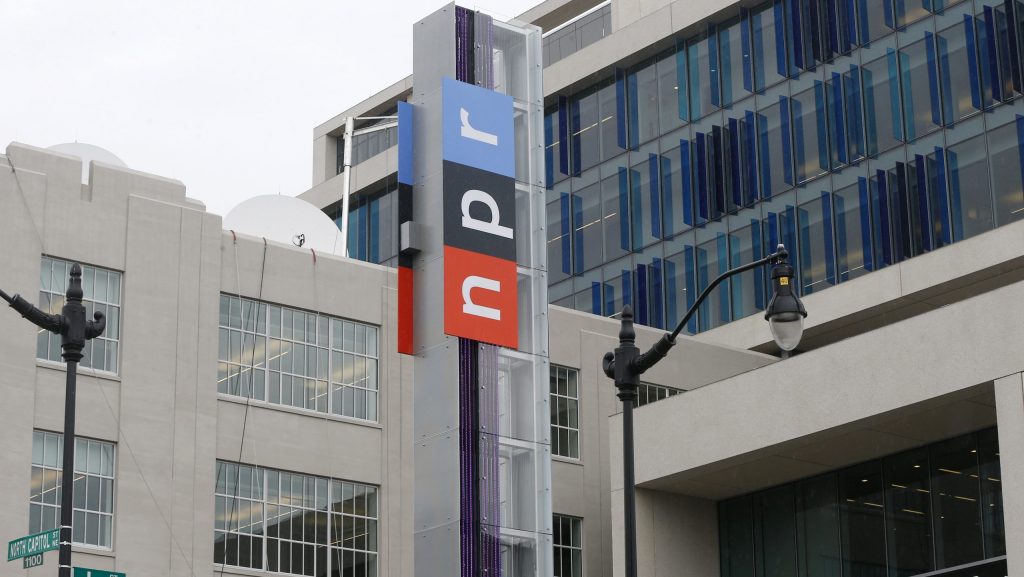Facing accusations of liberal bias, NPR vows reflection
A scathing editorial by a now-former NPR editor prompted discussion on social media and in public radio newsrooms across the country.

The NPR headquarters at North Capitol Street in Washington, DC.
Calling National Public Radio a “liberal” news source is nothing new. From the reserved, contemplative delivery of its hosts; to the analysis of its reporters that seems far removed from cable news screamfests – NPR presents itself in a very different way. Supporters, detractors, comedians alike — everyone’s got jokes.
So when Uri Berliner, a longtime business editor at NPR, writes a scathing editorial about how the network has lost its way, people are going to listen.
It hits different when the call is coming from inside the house.
Berliner resigned this week after being suspended for five days without pay — and after facing some criticism from NPR’s CEO. He accused his colleagues of skewing too far to the left and outright ignoring stories that could be considered favorable to then-president Donald Trump. Many of his examples do not stand up to scrutiny.
The overarching theme is that NPR — having hired reporters and editors of color over the past decade — is now suffering from “the absence of viewpoint diversity.”
NPR media reporter David Folkenflik worked alongside Berliner for years. In an interview with WDET, Folkenflik says Berliner’s feelings were nothing new.
“It’s not saying anything out of school to say these were concerns he raised,” Folkenflik said. “The morning before he resigned, he shared a memo he had sent to senior news executives on the day after the Trump won election in 2016. And he said, ‘you know, we’ve done a lot of things well, but we’ve also missed a big part of the story here and a big part of the chunk of the country here.'”
Unsurprisingly, Berliner’s column has drawn widespread praise from conservative media and has renewed calls to cut off the tiny amount of funding supplied to public media by the U.S. government. The Free Press, Berliner’s chosen forum for his editorial, itself proclaims itself to be free from bias, but it’s often far from the case.
“I think that the venue really affronted a number of his colleagues,” Folkenflik said. “Because it has tended to draw journalists who feel the mainstream media has become too liberal, it would argue it’s not a conservative site, but certainly conservatives have found a home there.”
Whether Berliner’s editorial has any lasting impact remains to be seen, but they have sparked a broader discussion among current and former public radio employees.
Alicia Montgomery is the vice president of audio at Slate. She published “The Real Story Behind NPR’s Current Problems” detailing her experiences in the two decades she spent at the network.
In the commentary, Montgomery debunks many of Berliner’s claims, but presented other concerning things.
“There were several reasons why good pitches died. The pitcher wasn’t high enough in the editorial landscape to be taken seriously. The resources were scarce because we were top-heavy and spread thin, trying to cover the country and the world, far beyond electoral politics.”
— Alicia Montgomery, vice president of audio at Slate.
Montgomery detailed spots where race — or a lack of diversity within the editorial staff — affected coverage and points out that despite its best efforts, NPR still has issues regarding race in both coverage and personnel.
Former NPR CEO John Lansing called his push to ensure the network has a bigger and broader audience base, rooted in younger and more diverse listeners and consumers his “North Star.”
Folkenflik says the last four years have started a lot of conversations and self-examinations at NPR and in newsrooms across the country.
“The social justice movement triggered by [the murder of] George Floyd transformed American society and discourse. And then the pandemic isolated all of us,” Folkenflik said. “I think that you’ve seen that lead to differences in hirings, but differences in the ways in which stories are defined and covered.”
NPR is more diverse than it has ever been. The question now is whether executives and editors will listen to their own reporters. Will you?
Editor’s note: WDET has received many questions and comments since the Berliner commentary dropped last week. We’ve been responding to all of them individually. Our conversation with David Folkenflik is part of a direct effort of transparency. The questions reflect some of those posed by and to WDET’s editorial staff and there are daily/weekly discussions in the newsroom about bias and best practices.
Trusted, accurate, up-to-date.
WDET strives to make our journalism accessible to everyone. As a public media institution, we maintain our journalistic integrity through independent support from readers like you. If you value WDET as your source of news, music and conversation, please make a gift today.
